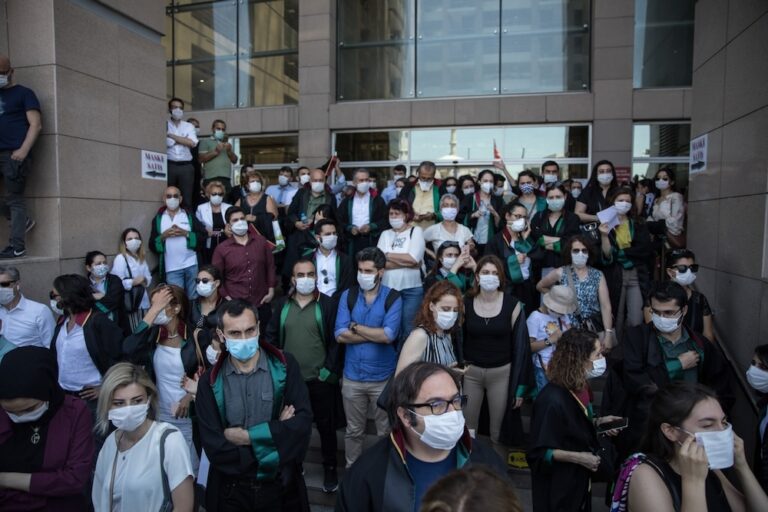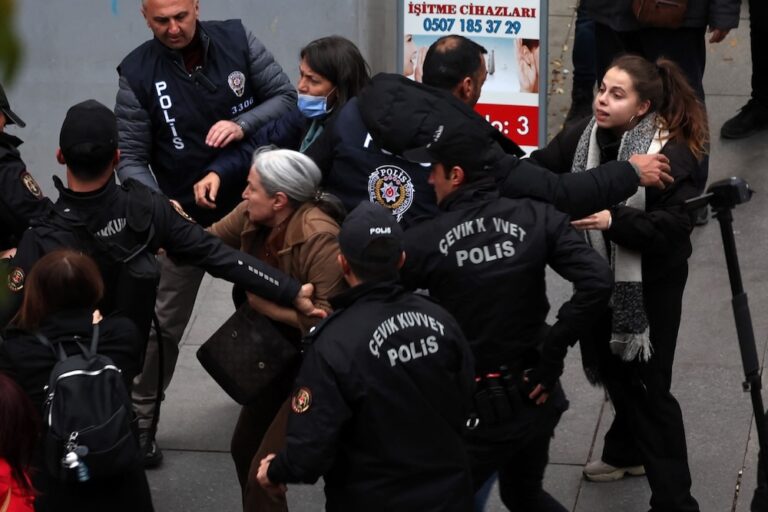(HRW/IFEX) – The following is a Human Rights Watch press release: **For background on other cases involving Akin Birdal see IFEX alert of 31 July 1998** Imprisonment of Leading Turkish Activist Condemned (New York, June 3, 1999) On the eve of the imprisonment of well-known human rights activist Akin Birdal, Human Rights Watch today condemned […]
(HRW/IFEX) – The following is a Human Rights Watch press release:
**For background on other cases involving Akin Birdal see IFEX alert of 31
July 1998**
Imprisonment of Leading Turkish Activist Condemned
(New York, June 3, 1999) On the eve of the imprisonment of well-known human
rights activist Akin Birdal, Human Rights Watch today condemned Mr. Birdal’s
one-year sentence as a violation of his right to free speech. Mr. Birdal is
president of the prominent Human Rights Association (HRA) of Turkey.
“The right to free speech is routinely violated in Turkey,” said Holly
Cartner, executive director of the Europe and Central Asia division of Human
Rights Watch. “Turkish governments since the 1980s have promised to lift
restrictions on freedom of expression, but Mr. Birdal’s experience shows how
hollow those promises are.”
Mr. Birdal was convicted and sentenced to 12 months’ imprisonment by the
Ankara State Security Court in July 1998 for a speech he made on September
1, 1996 calling for “peace and understanding” with respect to the Kurdish
minority. Birdal was convicted for “inciting racial hatred” under article
312 of the Turkish Penal Code. The indictment specifically mentioned
Birdal’s reference in the speech to “the Kurdish people” as an incriminating
phrase. The sentence was confirmed on appeal on October 27, 1998. As a
result of the conviction, Birdal will no longer be able to act as president
of the HRA and will no longer be permitted to be an official of any
association. The ban is a lifetime ban, but may be appealed after five
years. There are several other charges currently pending against Birdal, all
related to his writings and public speeches. He will serve his sentence at
the Ankara Central Closed Prison.
Ms. Cartner noted that although Turkey claims to be a democracy, Turkish
citizens run the risk of prosecution, imprisonment, and sometime worse if
they try to begin a peaceful public dialogue on a sensitive topic such as
the rights of the Kurdish minority.
In addition to facing numerous criminal prosecutions, Birdal was physically
attacked on May 12, 1998, when two gunmen entered his office in downtown
Ankara and shot him seven times in the lungs and leg. The attack followed a
reckless campaign in the press purportedly based on leaked information from
the prosecutor’s office about alleged connections between the Workers Party
of Kurdistan (PKK) and the Human Rights Association. These accusations were
later shown to be false. Immediately after the attack, then-Prime Minister
Mesut Yilmaz repeated the accusations against the HRA, describing the attack
as part of an internal feud within the PKK. However, the extreme right-wing
organization Turkish Revenge Brigade took responsibility for the attack.
Currently, a number of people, including a retired army major, are on trial
for the attempted murder of Mr. Birdal.
In addition to Mr. Birdal, a number of others are already serving prison
sentences for their statements or writings, including the former leader of
the Socialist Labor Party Dogu Perincek, the former mayor of Istanbul Recep
Tayyip Erdogan, and the lawyer Esber Yagmurderali. Others, such as the
journalist Oral Calislar, are currently awaiting sentencing (see IFEX alerts
of 20 May 1999 and 24 July 1998).
For more information see Human Rights Watch report Violations of Free
Expression
in Turkey, April 1999, which can be located at
http://www.hrw.org/reports/1999/turkey.


